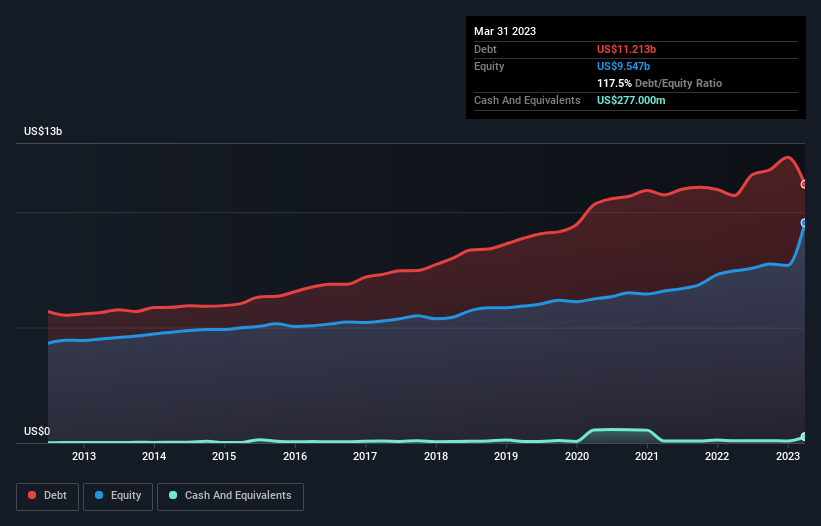- United States
- /
- Water Utilities
- /
- NYSE:AWK
Here's Why American Water Works Company (NYSE:AWK) Has A Meaningful Debt Burden

The external fund manager backed by Berkshire Hathaway's Charlie Munger, Li Lu, makes no bones about it when he says 'The biggest investment risk is not the volatility of prices, but whether you will suffer a permanent loss of capital.' It's only natural to consider a company's balance sheet when you examine how risky it is, since debt is often involved when a business collapses. Importantly, American Water Works Company, Inc. (NYSE:AWK) does carry debt. But should shareholders be worried about its use of debt?
What Risk Does Debt Bring?
Debt assists a business until the business has trouble paying it off, either with new capital or with free cash flow. If things get really bad, the lenders can take control of the business. However, a more frequent (but still costly) occurrence is where a company must issue shares at bargain-basement prices, permanently diluting shareholders, just to shore up its balance sheet. By replacing dilution, though, debt can be an extremely good tool for businesses that need capital to invest in growth at high rates of return. The first thing to do when considering how much debt a business uses is to look at its cash and debt together.
Check out our latest analysis for American Water Works Company
How Much Debt Does American Water Works Company Carry?
You can click the graphic below for the historical numbers, but it shows that as of March 2023 American Water Works Company had US$11.2b of debt, an increase on US$10.7b, over one year. However, it does have US$277.0m in cash offsetting this, leading to net debt of about US$10.9b.

How Healthy Is American Water Works Company's Balance Sheet?
The latest balance sheet data shows that American Water Works Company had liabilities of US$1.89b due within a year, and liabilities of US$16.8b falling due after that. On the other hand, it had cash of US$277.0m and US$703.5m worth of receivables due within a year. So its liabilities outweigh the sum of its cash and (near-term) receivables by US$17.8b.
This deficit is considerable relative to its very significant market capitalization of US$28.5b, so it does suggest shareholders should keep an eye on American Water Works Company's use of debt. Should its lenders demand that it shore up the balance sheet, shareholders would likely face severe dilution.
In order to size up a company's debt relative to its earnings, we calculate its net debt divided by its earnings before interest, tax, depreciation, and amortization (EBITDA) and its earnings before interest and tax (EBIT) divided by its interest expense (its interest cover). This way, we consider both the absolute quantum of the debt, as well as the interest rates paid on it.
With a net debt to EBITDA ratio of 5.3, it's fair to say American Water Works Company does have a significant amount of debt. But the good news is that it boasts fairly comforting interest cover of 3.5 times, suggesting it can responsibly service its obligations. Fortunately, American Water Works Company grew its EBIT by 7.7% in the last year, slowly shrinking its debt relative to earnings. The balance sheet is clearly the area to focus on when you are analysing debt. But it is future earnings, more than anything, that will determine American Water Works Company's ability to maintain a healthy balance sheet going forward. So if you're focused on the future you can check out this free report showing analyst profit forecasts.
But our final consideration is also important, because a company cannot pay debt with paper profits; it needs cold hard cash. So it's worth checking how much of that EBIT is backed by free cash flow. Over the last three years, American Water Works Company saw substantial negative free cash flow, in total. While that may be a result of expenditure for growth, it does make the debt far more risky.
Our View
To be frank both American Water Works Company's net debt to EBITDA and its track record of converting EBIT to free cash flow make us rather uncomfortable with its debt levels. But on the bright side, its EBIT growth rate is a good sign, and makes us more optimistic. It's also worth noting that American Water Works Company is in the Water Utilities industry, which is often considered to be quite defensive. Looking at the bigger picture, it seems clear to us that American Water Works Company's use of debt is creating risks for the company. If all goes well, that should boost returns, but on the flip side, the risk of permanent capital loss is elevated by the debt. There's no doubt that we learn most about debt from the balance sheet. However, not all investment risk resides within the balance sheet - far from it. Case in point: We've spotted 4 warning signs for American Water Works Company you should be aware of, and 1 of them shouldn't be ignored.
If you're interested in investing in businesses that can grow profits without the burden of debt, then check out this free list of growing businesses that have net cash on the balance sheet.
New: Manage All Your Stock Portfolios in One Place
We've created the ultimate portfolio companion for stock investors, and it's free.
• Connect an unlimited number of Portfolios and see your total in one currency
• Be alerted to new Warning Signs or Risks via email or mobile
• Track the Fair Value of your stocks
Have feedback on this article? Concerned about the content? Get in touch with us directly. Alternatively, email editorial-team (at) simplywallst.com.
This article by Simply Wall St is general in nature. We provide commentary based on historical data and analyst forecasts only using an unbiased methodology and our articles are not intended to be financial advice. It does not constitute a recommendation to buy or sell any stock, and does not take account of your objectives, or your financial situation. We aim to bring you long-term focused analysis driven by fundamental data. Note that our analysis may not factor in the latest price-sensitive company announcements or qualitative material. Simply Wall St has no position in any stocks mentioned.
About NYSE:AWK
American Water Works Company
Through its subsidiaries, provides water and wastewater services in the United States.
Average dividend payer with acceptable track record.
Similar Companies
Market Insights
Community Narratives



